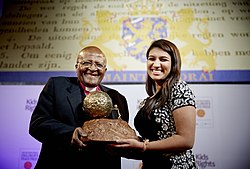| International Children's Peace Prize | |
|---|---|
 Archbishop Desmond Tutu awarding the International Children's Peace Prize to Neha Gupta in 2014. | |
| Awarded for | Outstanding contributions in advocating children's rights |
| Location | Amsterdam, Netherlands |
| Reward | €100,000 or $123,000 |
| First award | 2005 |
| Currently held by | KidsRights Foundation |
| Website | childrenpeaceprize.org |
The International Children's Peace Prize is awarded annually to a child who has made a significant contribution to advocating children's rights and improving the situation of vulnerable children such as orphans, child labourers and children with HIV/AIDS. It holds a reputation as one of the leading youth prizes internationally. [1]
Contents
The prize is an initiative of Marc Dullaert, founder of the KidsRights Foundation, an international children's aid and advocacy organisation based in Amsterdam, the Netherlands. [2]
The winner receives a 100,000 euro donation to benefit a charitable project for children, as well as a statuette, the Nkosi, named in honour of Nkosi Johnson. The statuette is of a child pushing a ball, "show[ing] how a child sets the world in motion." [2]